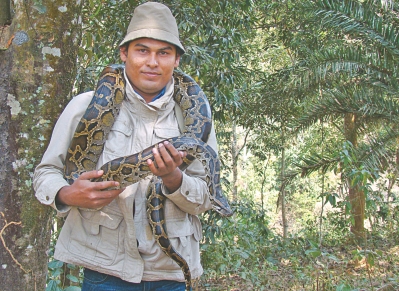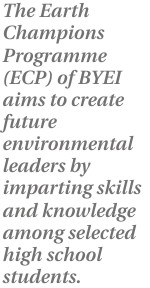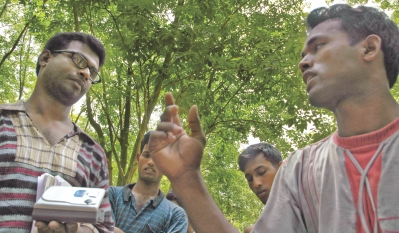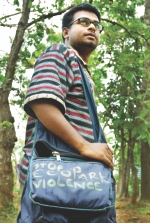
Mushfiq Ahmed
Ecologist
 Mushfiq Ahmed has been working on nature and biodiversity conservation in Bangladesh for the last 6 years. He completed his B.Sc. (Honours) and M.Sc. in Biological Science, specialising in Wildlife Ecology, Management and Conservation Biology from Jahangirnagar University. Immediately after completing his M.Sc. in 2008, he joined CEGIS (Centre for Environmental and Geographic Information Services) under the Ministry of Water Resources as an Ecological Consultant. He was assigned for special IEE (Initial Environmental Engineering) and EIA (Ecological Impact Assessment) work for different projects of the ministry. During his tenure at CEGIS he travelled to almost all the districts of Bangladesh for research work where he got the chance to observe wildlife. He observed nature from an ecologist's point of view and realised that Bangladesh's ecosystem was under great threat. He points out the main problem; most people don't know much about the basics of the ecosystem and the importance of nature.
Mushfiq Ahmed has been working on nature and biodiversity conservation in Bangladesh for the last 6 years. He completed his B.Sc. (Honours) and M.Sc. in Biological Science, specialising in Wildlife Ecology, Management and Conservation Biology from Jahangirnagar University. Immediately after completing his M.Sc. in 2008, he joined CEGIS (Centre for Environmental and Geographic Information Services) under the Ministry of Water Resources as an Ecological Consultant. He was assigned for special IEE (Initial Environmental Engineering) and EIA (Ecological Impact Assessment) work for different projects of the ministry. During his tenure at CEGIS he travelled to almost all the districts of Bangladesh for research work where he got the chance to observe wildlife. He observed nature from an ecologist's point of view and realised that Bangladesh's ecosystem was under great threat. He points out the main problem; most people don't know much about the basics of the ecosystem and the importance of nature.
Despite the country's size, he has observed that the genetic resources present are huge. There is a wide range of species of wild flora and fauna. Here, the wilderness has tremendous gene diversity, which has enormous potential in commercial uses but is often not given proper attention. Traditionally the vast majority of the population in Bangladesh rely upon natural resources for their livelihood. This is more than true for the poorest sections of the society who dwell in and around the wetlands and forests. Minor produces from the forests and wetlands are heavily extracted by the locals. These natural resources are the source of food, fodder, fuel, house building materials and also a source of medicine for the poor. Although at an individual level this extraction is negligible but if summed up, the figure is too high and goes beyond the carrying capacity of nature.
In addition, the climatic impact enhanced the vulnerability of coastal communities and resources. Negative impacts of climate change are vigorously popularised but the positives are ignored. Some of the biological resources are under-utilised but most are over-utilised. A balance in use of natural resources could make these resources sustainable. Thus, the need to raise awareness on nature and its resources among the masses could be the most important tool to save the natural resources of the country.
Bearing these in mind, Mushfiq was doing his research. But one day he got an opportunity to work with “Prokriti O Jibon”. He met with Muqeed Majumdar Babu, the chief planner, director and anchor of “Prokriti O Jibon (Nature and Life)”, the first television series in Bangladesh that features the biodiversity of the country and addresses how important it is to conserve this biodiversity. The programme is trying to help save the threatened wildlife and their habitat and it is also presenting 'natural history and heritage of Bangladesh'. From the beginning of this TV series, Mushfiq began working for it as a researcher and scriptwriter. Muqeed Majumdar Babu set up Prokriti O Jibon Foundation at the same time to continue the research parallel to the programme.
One of the main projects of the foundation was producing the “Prokriti o Jibon” TV series. This weekly programme is aired on Channel i. The programme has identified the associated threats such as pollution, lack of knowledge about wildlife and nature, fragmentation and loss of habitat for wildlife, change of land use (high population growth and natural resource consumption), climate change impacts, change in hydrological regime etc. The show also highlights the gaps and hurdles that still remain in different areas/sectors, which need to be addressed for attaining the targets of biodiversity conservation.
Besides this TV show, the overall aim of the foundation is to showcase the importance of conservation and sustainable management of natural resources including wildlife, and how nature has been contributing to sustaining the livelihood of the rural poor through documentaries, books, manuals, leaflets etc.
The show has already created mass awareness through properly documenting the wildlife and natural resources available. For example, the show led to the halt of the 150-year old turtle fair in Gopalganj where thousands of turtles used to be killed every year. After airing the “turtle episode” on TV, the concerned authorities acted promptly to immediately stop this brutal tradition.
As a team leader in the field, Mushfiq Ahmed enjoys the filming of “Prokriti O Jibon”. The well-equipped team is a very good combination of different scientists and camera crew. Practical knowledge of biologists is the basis of locating the wildlife.
Till date, the focus of the programme is ecosystems rather than a particular species. However, interesting behavioural patterns of wildlife are recorded such as how species are interlinked with other biotic components -- prey, predators, neighbours, population and community. Similarly the abiotic components such as water, soil, air, rain, temperature, drought, winter, floods and their interaction with the biotic components of the ecosystem get priority in this stage of documentation.
During field visits some small scale awareness activities are also happening via their Nature and Life team like school programmes; meeting with local people, religious leaders, teachers, local administration and other influential people who command enough respect to convey the message to others.
To create awareness about nature and its resources is not an easy task in developing countries like Bangladesh where problems are numerous. People are struggling to ensure food, housing and basic education for themselves. Those who are living in or around the forests, wildlife sanctuaries and other natural resourceful areas are solely or partially dependent on these resources. They are ignorant about their detrimental role towards nature. Creating awareness among the nature dependent people requires making them familiar with beneficial roles of natural resources and alternate use of the resources and showing them the ecological chain of nature. They need to be informed about how they can use the natural resources in a sustainable way.
Mushfiq Ahmed knows the challenges and is willing to meet them head on. The author of two books has personally vowed to protect Mother Nature and lead others to do the same.
Compiled by Correspondent
Shamir Shehab
Environmental Activist & Organiser
Shamir Shehab and his organisation, Bangladesh Youth Environmental Initiative (BYEI) -- a youth-led, non-profit organisation -- have been working tirelessly for the betterment of Bangladesh's deteriorating environmental situation.
BYEI aims to arm the youth of today with proper knowledge and leadership skills to combat the environmental degradation and build a sustainable future.
 In 2009, immediately after conceiving the idea of BYEI, Shehab started reaching out to many to convince them of his ideas and take actions. So far, thousands of youngsters of different academic institutions across the country have been reached to assemble a movement towards environmental sustainability.
In 2009, immediately after conceiving the idea of BYEI, Shehab started reaching out to many to convince them of his ideas and take actions. So far, thousands of youngsters of different academic institutions across the country have been reached to assemble a movement towards environmental sustainability.
The Earth Champions Programme (ECP) of BYEI aims to create future environmental leaders by imparting skills and knowledge among selected high school students on inter-connected environmental issues through lectures, small group exercises, role play, debates, case studies and presentations.
After training, each of the ECP fellows set up an environmental club at their respective institutions and carries out environmental actions. Also, the ECP fellows are required to formulate community-based projects and implement them. The community-based projects and environmental clubs receive their primary funds from BYEI.
In November 2011, BYEI organised a two-day long 'South Asian Youth Environment Meet', which gathered the brightest young leaders of South Asia along with 100 Bangladeshi prodigies.
BYEI also launched an environmental photography exhibition, “e360°” that highlights the inter-related environmental problems and their solutions. BYEI also organised daylong awareness programmes at different universities, campaigning about the ways of limiting the carbon footprint at personal level, the impacts of global warming and the hazardous future with rising carbon emission.
BYEI successfully reached about 6,000 young minds through distributing 3,000 brochures and one to one interactions. It regularly organises seminars and dialogues on inter-connected environmental issues all through Bangladesh. It recently opened a research wing that will engage young activists by facilitating advanced research on multidimensional environmental issues.
BYEI's signature programme ECP earned Shamir Shehab the 2011 Alumni Engagement Innovation Fund from the U.S. Department of State. BYEI has been recognised at different international forums including the 2010 Shanghai Award, Clinton Global Initiative University (CGIU) 2010, The Mosaic International Summit 2011, UNEP-TUNZA International Conference etc.
By Nousheen Zoarder
Pavel Partha
Ethnobotanist & Writer
 |
Photo: Amirul Rajiv |
Pavel Partha, a research activist and writer (ecology and biodiversity conservation), has made a mark as one of the most erudite figures of this generation. Currently, he is working for BARCIK, a national non-governmental research-based organisation, as a coordinator. Mostly, he writes research articles, narratives, stories, columns and sometimes poetry. His distinctive writings and columns have been published in different journals, books, magazines and dailies. He is a regular columnist at the daily Prothom Alo, Samakal, Daily Sun, Bonikbarta etc. His areas of interest include political ecology, biological diversity, indigenous wisdom, CHT issues, peoples' struggles against corporate control, politics of representation, philosophy involving life and nature, environmental justice, local knowledge, ethnoscience, ethnobotany, subaltern studies, gender justice, development disaster, climate politics and so on.
Partha was born in 1976 in Srimangal, Maulvibazar. He completed his SSC and HSC from Narsingdi. He graduated from Jahangirnagar University in Botany securing first class both in B.Sc. (Honours) and in M.Sc. He is now pursuing his M.Phil. degree at JU. His thesis title is “Cross-cultural Ethnobotanical Relationship and Ecological Justice of Indigenous People in CHT.”
 |
Photo: Amirul Rajiv |
As a child, he learnt about the struggles of tea-garden workers, and hence does not drink tea in protest. The struggle for forest rights of indigenous people, protection of biological diversity, subaltern philosophy, eco-feminism, politics of representation, ecological justice, local knowledge and ethnoscience, climate politics, oppressed religious practices, development disaster, jhum cultivation and agrarian revolution form the crux of his works.
He is particularly known for conducting a pioneering large-scale ethnobotanical research in Bangladesh. He researches, writes and organises, protesting the establishment of eco parks and safari park at the expense of indigenous livelihood and ecological justice. His significant critiques are on the control of Asian Development Bank over the natural Sal forest of Madhupur, granting Shell permission for oil and gas extraction in the world's largest mangrove forest Sundarban, constitutional rights of indigenous people, cutting the hills in the Chittagong Hill Tracts, Occidental-Unocal and Chevron's invasion of the Lawacherra rain forest, commercial shrimp farm expansion in the south-western parts of Bangladesh and sexual harassment at Jahangirnagar University.
Partha has published a number of books. He is the author of “Khaddo, Longhon O Lorai” (an eco-political analysis of food security and food struggle in Bangladesh; 2010, in Bengali), “Aronner Lorai” (forest policies and forest rights of indigenous peoples of Bangladesh; 2010, in Bengali), “Uttarbanger Adibashi Muktijoddha” (freedom fighters of indigenous communities in north Bengal; 2009, in Bengali), “Madhupurer Pranboichitro” (biological diversity of Madhupur Sal forest -- a political-ecological analysis of indigenous peoples' relationship with the forest in Madhupur; 2004, in Bengali) and “Krisohker Beej Adhikar” (farmers' rights to seeds; 2004, in Bengali). He has also compiled the books of “Grameen Jibonjatra Mela 1415” (a compilation of rural agrobiodiversity and livelihood fair; 2009, in Bengali), “Nao-jatra” (compilation of a peoples' campaign on boat-caravan for sustainable agriculture and economic justice in the haor areas; 2008, in Bengali and English) and “Jatiya Beej Ghoshona 1411” (a booklet on national seed declaration).
By Mohammad Hasan Jan